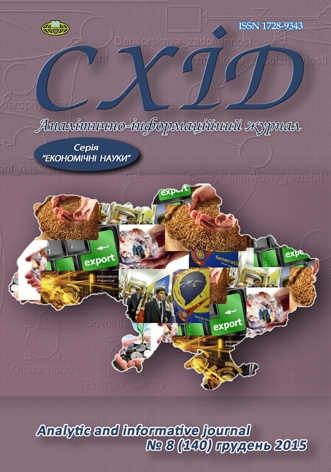Modelling of management strategy of a housing and public utility
DOI:
https://doi.org/10.21847/1728-9343.2015.8(140).59628Keywords:
housing and public utilities, heat supply company, management, simulation modeling, scenario analysisAbstract
The paper presents the author's approach to ensuring the sustainability of housing and public utilities (HPU). The main methods for securing financial stability of the HPU operation are indicated and analyzed. It is established that the key problems affecting the sustainability of the HPU system relate to the operational element i.e. individual enterprises of the industry. The author demonstrates that improvement of the HPU management system is the most expedient method for enhancement of the HPU sustainability. The analysis also focuses on effectivization of sustainability management of heat supply companies. An integrated model for management of a heat supply company is developed, which is decomposed into 3 submodels: 1) an unpaid demand management model (submodel 1); 2) a lost demand management model (submodel 2); 3) an integrated management model for a heat supply company, which is based on modelling results of submodels 1-2 (submodel 3). To describe the set of the models (1-3), the author applies the simulation modeling technique in the environment of the PowerSіm Application Program Package.
A scenario analysis is used to assess the efficiency of various management levers for a heat supply company, some conclusions drawn as to the effectiveness of applying such a scenario as improvement of service, which allows achieving a short-term and long-term growth of the liquid financial result as well as a long-term growth of its financial performance.References
Law of Ukraine«On national program of reform and development of Housing for 2009-2014» № 1511-VI (2009), Bulletin of the Verkhovna Rada of Ukraine, № 47-48, Art. 720 (ukr).
Tishchenko O.M., Kizim M.A., Yurieva T.P. (2008), Reforming Housing: theory, practice, prospects, Publishing house «INZHEK», Kharkiv, 368 p. (ukr).
State Statistics Committee of Ukraine, available at : http://www.ukrstat.gov.ua.
Gubernaya G. K. (2010), Overcoming market gaps in the functioning of housing and communal services: the city and the local government, News ІEPD National Academy of Sciences of Ukraine, № 1, p. 9-13 (rus).
Khobta V.M., Zavorotnyeva O.V. (2012), The problems of water use and Ukraine, Development of modern lohistic and oriented economy: Coll. Science. works of Donetsk State University of Management series «Economics»; Issue 227, Vol. XII, DonDUU Press, Donetsk, p. 219-224 (ukr).
Shunevich N. Housing Reform inUkraine: convulsions before collapse, available at: http://atku.org.ua/today/96/1164/
Petrushevsky Y.L. (2012), Transforming Economy Housing, Ukraine National Academy of Sciences, Institute of Indastrial Economic; DonDUU Press, Donetsk, 292 p. (ukr).
AleksandrovI.O., Polovyan O.V., Tarasova M.Yu. (2010), Forming tools of tariff policy of the company water complex, Economics and Law, №1 (26), p.85-91 (ukr).
Brazhnikova L.N. (2010), Strategic financial management utilities, Yugo-Vostok Ltd,Donetsk, 499 p. (rus).
Havrylchenko Yu. Increase of tariffs in the housing sector deteriorates the quality of services, available at : finzah.com.ua.
Hura N. (2006), Accounting in housing: Theory and Practice, Znannia Press, Kyiv, 351 p. (ukr).
Osipenko I.M., Dorofiyenko V. V. (2002), Management of housing and communal services, Osnova Ltd, Kharkov, 352 p. (rus).
Poluyanov V.P. (2004), Organizational-economic mechanism of effective functioning of housing and communal services, Institute of Indastrial Economics Press, Donetsk, 220 p. (rus).
Lysenko Y.G. and other (2011), The quality management system of water supply and sewage, Donetsk National University Press,Donetsk, 461 p. (ukr).
Werner S. (2007), Sweden’s heat infrastructure policy, Global CHP/DHC Policy Best Practices, October, 10-11 (eng).
National CHP Roadmap (2001), Doubling combined heat and power capacity in the United Statesby 2010, US Combined heat and power association, March (eng).
Water Department Overview (1998), City of Tucson, Adopted Budget Operational Detail, Tucson, W.P., Arizona, p. 329-330 (eng).
Ignotas A. (2004), Lithuanian legal and regulatory framework for district heating, Presented at IEA workshop «District heating policy in transition economies».Prague. February (eng).
Myznikova M.A. (2013), Simulation offers the services of housing and utilities, The collection of scientific articles «The new economic cybernetics», №4,Donetsk, p. 46-51 (rus).
Zhalilo Y. O., Bazyliuk Y. B., Belinska Y.V. etc. (2005), The competitiveness of Ukraine’s economy under globalization, NISS Press, Kyiv, 388 p. (ukr).
InstituteofSociology. Monitoring the process of reforming housing and communal services in the financial crisis, available at : http://www.minjkg.gov.ua/.
Myznikova M.A. (2013), Construction of the integrated model management of heating systems, Materials of III International scientific-practical conference «World economy, finances and investments», 25-27 May, W.P., Donetsk, p. 25-27 (rus).
Myznikova M.A. (2014), Modeling demand enterprises teplokommun Energy, Materials of VII International Conference «Problems of management of production and economic activities of economic entities,» May 22, Donetsk, p. 44-48 (rus).
Downloads
Published
How to Cite
Issue
Section
License
Copyright (c) 2016 Mariia Myznikova

This work is licensed under a Creative Commons Attribution-NonCommercial-NoDerivatives 4.0 International License.
1. Authors bear responsibility for the accuracy of facts, quotations, numbers and names used.
2. Manuscripts are not sent back.
3. The publisher does not always agree with the authors' opinion.
4. The authors reserve the right to authorship of the work and pass the first publication right of this work to the journal under the terms of a Creative Commons Attribution Non-Commercial License, which allows others to freely distribute the published research with the obligatory reference to the authors of the original work and the first publication of the work in this journal.
5. The authors have the right to conclude separate supplement agreements that relate to non-exclusive work distribution in the form in which it has been published by the journal (for example, to upload the work to the online storage of the journal or publish it as part of a monograph), provided that the reference to the first publication of the work in this journal is included.

